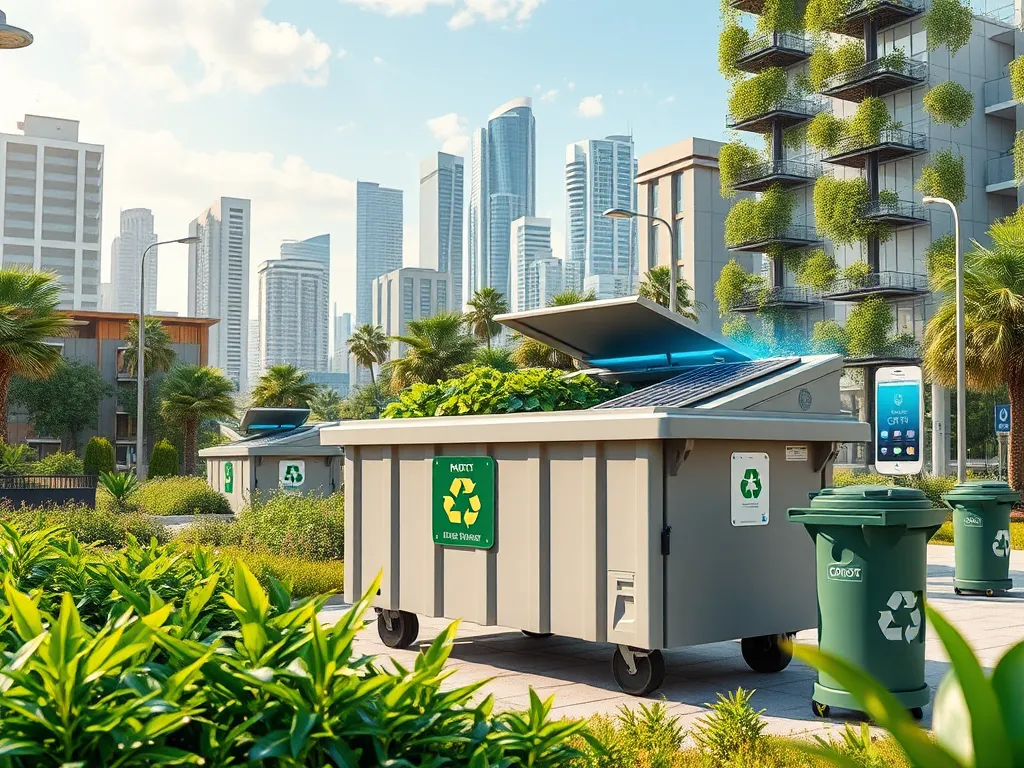Innovations in Dumpster Rental: Future of Waste Removal Technology

Innovations in Dumpster Rental and Waste Removal Technology
The landscape of waste management is rapidly changing, thanks to numerous innovations in dumpster rental and waste removal technology. This sector, traditionally viewed as outdated, is experiencing a technological renaissance that enhances efficiency, reduces environmental impact, and improves user experience. Innovations in dumpster rental and waste removal technology are paving the way for a more sustainable and streamlined approach to waste disposal.
Smart technology is at the forefront of these innovations, transforming conventional dumpsters into intelligent waste management tools. With the help of Internet of Things (IoT) devices, dumpsters can now provide real-time data on waste levels, enhancing collection schedules and reducing unnecessary trips. These advancements are set to optimize operations for both service providers and customers.
Eco-friendly solutions are also gaining momentum, with companies focusing on biodegradable materials and recycling technologies. This movement not only aligns with global sustainability goals but also encourages waste reduction practices among users. The integration of eco-friendly solutions into waste management processes highlights the importance of responsible disposal and resource conservation.
Mobile applications are revolutionizing how customers interact with waste removal services. By offering platforms that allow users to book dumpster rentals, track collection schedules, and rate service providers, these apps simplify the waste management process. The ease of technology adoption is making waste management more accessible and user-friendly.
Lastly, automated waste sorting systems are a key innovation that is reshaping the industry. These systems leverage artificial intelligence and robotics to enhance waste segregation, thereby improving recycling rates and reducing landfill contributions. Investing in such technologies is not only beneficial for the environment but also maximizes the efficiency of waste processing facilities.
For those seeking reliable support, the services offered by RTS can be invaluable.
Smart Dumpster Technology
Smart Dumpster Technology is revolutionizing the efficiency of waste management through IoT-enabled dumpsters that provide real-time tracking. Service providers can monitor the status of dumpsters remotely, ensuring timely pickups and preventing overflow situations. This technological advancement reduces operational costs and enhances the user experience by minimizing delays.
Additionally, sensor technology plays a critical role in monitoring waste levels within dumpsters. Sensors can alert waste management companies when a dumpster is nearing capacity, allowing for proactive scheduling of waste collection. This not only ensures timely service but also optimizes the use of resources and reduces unnecessary trips, which ultimately lowers emissions.
Automated alerts for pick-up scheduling are another significant feature of smart dumpster technology. Customers can receive notifications when their dumpster is due for collection, ensuring that waste does not pile up and creating a more organized waste removal process. This level of automation enhances customer satisfaction and allows for more precise management of waste logistics.
Eco-Friendly Waste Solutions
Eco-Friendly Waste Solutions are becoming integral to modern waste management strategies. The use of biodegradable dumpster liners and materials is a standout innovation that helps minimize environmental impact. These materials decompose naturally, reducing the amount of plastic waste associated with traditional dumpsters and promoting sustainability.
Recycling technology integration is another essential aspect of eco-friendly innovations. Many dumpster rental companies are adopting advanced recycling techniques that streamline the sorting process and improve recycling rates. By utilizing state-of-the-art machinery and practices, these companies are increasing the efficiency of recycling operations and encouraging responsible disposal methods.
Furthermore, the reduction of carbon footprint in waste management practices is a critical concern for the industry. Innovative solutions such as electric waste collection vehicles and optimized routing systems contribute to lowering greenhouse gas emissions and fostering a healthier environment. By addressing these issues, the waste management sector is aligning itself with global climate goals.
Mobile Apps for Waste Management
Mobile Apps for Waste Management are revolutionizing how consumers engage with dumpster rental services. These user-friendly platforms allow individuals to book dumpster rentals with ease, providing them with control over their waste management needs. The convenience of mobile technology has simplified the process, making dumpster rentals accessible to a broader audience.
Real-time tracking of waste collection is another standout feature of these mobile apps. Users can monitor the status of their dumpster rentals and collection schedules, enhancing transparency and ensuring peace of mind. This level of tracking minimizes uncertainty and allows users to manage their waste more effectively.
Additionally, ratings and reviews for service providers are a vital component of mobile apps. By enabling users to provide feedback, these platforms enhance accountability and encourage high-quality service. This feature empowers customers to make informed decisions and fosters a community of trust within the waste management industry.
Automated Waste Sorting Systems
Automated Waste Sorting Systems are transforming the efficiency and effectiveness of waste processing. AI-driven sorting technologies utilize sophisticated algorithms to differentiate recyclables from compostables and landfill waste. This precision in sorting enhances recycling rates and reduces contamination, leading to more effective waste management.
Robotic waste segregation technologies are also gaining traction. These advanced systems utilize robotic arms and machine learning to identify and separate materials with high accuracy. This innovation significantly reduces the need for manual labor and increases the speed of waste processing, ultimately leading to cost savings for facilities.
Improving efficiency in waste processing facilities through automation not only enhances operational performance but also contributes to a more sustainable waste management ecosystem. By optimizing sorting processes, facilities can better allocate resources and minimize the environmental impact of waste disposal.
Fleet Management Innovations
Fleet Management Innovations are crucial for optimizing waste collection operations. GPS tracking technology allows waste management companies to monitor vehicle locations in real-time, improving coordination and ensuring efficient collections. This level of oversight enhances accountability and operational efficiency.
Optimized route planning is another area where innovation is making a significant impact. By analyzing traffic patterns and waste collection data, companies can develop routes that minimize travel time and reduce emissions. This innovation not only saves on fuel costs but also supports environmental sustainability initiatives.
Telematics for maintenance and fuel efficiency is an emerging trend that uses data insights to improve fleet performance. By analyzing vehicle performance metrics, waste management companies can schedule preventive maintenance and make informed decisions to optimize their operations. This proactive approach results in reduced downtime and long-term cost savings.
Data Analytics in Waste Management
Data Analytics in Waste Management is an indispensable tool for modern waste management strategies. Utilizing big data to predict waste generation trends allows companies to align their services with community needs and optimize resource allocation. By interpreting data trends, waste management companies can make informed decisions and enhance their service delivery.
Analyzing trends for better service expansion is another significant benefit of data analytics. Companies can assess service demand in specific regions, allowing them to expand operations where needed. This data-driven approach ensures that waste management services are both efficient and responsive to community needs.
Lastly, improving operational efficiency through data insights enables waste management companies to identify areas for cost reduction and better service delivery. By leveraging analytics, these companies can continuously refine their operations, enhancing overall performance and promoting sustainability within the industry.
